Video Games as Infrastructures of Resistance
Analyzing the social and communicative affordances of video games hosting social movements
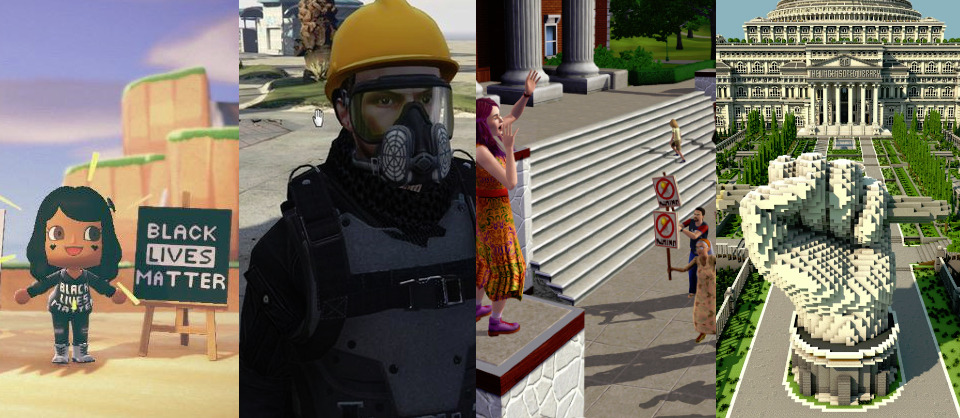
By Dorus Kok, Yentel Boot, Frederikke Christiansen and David Dijkhuis
This blog post covers a heavily understudied area of digital activism: online video games. With people in self-isolation and trapped in their houses for over half a year now, it is crucial that we recognize the creative ways people are still letting their opinions be heard in new and creative ways. The pandemic has highlighted the need to look at digital video games as areas where resistance and social movements can take root.
Introduction
In April 2020, The People’s Republic of China officially banned a peaceful life-simulation game, where players can settle and build up their own islands in ways they see fit. It seems out of order for China to ban such a peaceful, calm game like Animal Crossing: New Horizons. However, the game was not just used to simulate calm island life; rather, it was used to spread pro-Hong Kong messages. One of the leaders of the protests, Joshua Wong, tweeted the following back in April:
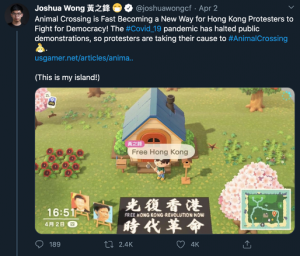
This is one of the most striking examples of how online video games afford an environment of resistance. In this essay, we will consider video games in this exact way. How are video games structured to facilitate a particular kind of socio-political expression and how do they contribute to a social movement logic that political scientists W. Lance Benett and Alexandra Segerberg term connective action (Benett and Segerberg 2012, 739)? Connective action is conceived to be a particular mode of social action in a digital environment, which they refer to as Dynamic Network Action. They focus on social media platforms such as Facebook and Twitter as critical infrastructures of organization in such movements as Occupy Wall Street (2011), the Arab Spring (2010-2012), and the “Los Indignados” movement in Spain (2011). However, recent social movements such as the aforementioned Hong Kong Protests (2019-2020) and the George Floyd protests (2020) show that a narrow focus on social media platforms is insufficient. It is important to expand our notion of digital media to incorporate the roles that video games both play and can play in social movements.
In order to determine how video games allow social movement expressions to take root, affordance theory can offer many insights and clarifications. Although affordances were originally conceptualized by William Gibson as forms of action that a particular environment enables (Gibson 1986, 127), Donald Norman reconceptualized affordances more in terms of perception, as action possibilities that are not completely determined by the technology or the itself (Norman 1988). Nowadays, the landscape of affordances has become so broad and disorganized that using the term without specification or clarification would make the term hollow and unusable (Davis and Chouinard 2016, 241). Therefore, in this essay, we focus on social and communicative affordances since these are the most important in social movement expression.
In 1996, design scholar William Gaver analyzed that affordances exist to be actively explored and that they exist not just for individual action, but for social interaction as well (Gaver 1996, 114). Gaver analyzed that technologies afford certain kinds of social and communicative actions, which can be respectively defined as the “possibilities that technological changes afford for social relations and social structure” and as “the possibilities for action that emerge from […] given technological forms. (Wellman 2001, 228; Hutchby 2001, 30).” These affordances are different in the sense that communicative affordances specifically focus on how technology impacts communication (Shrock 2015, 1233). We will analyze the social and communicative affordances of a select group of video games by using Davis and Chouinard’s analysis on how artifacts afford: by looking at what they request, demand, encourage, refuse, and allow (Davis and Chouinard 2016, 242).
The online video games we chose are those which are known to have hosted recent social movements. Of course, this selection has some restrictions. It does not include mobile games or multiple other online or offline video games that may serve as hosts for socio-political expression. However, analyzing how the affordances of video games give rise to social movements, in general, is far beyond the scope of this essay. This essay seeks to explain why in certain video games social movements could take root, to imagine video games as infrastructures of resistance and as a vital part of the digital infrastructures that govern connective action. The games that we have chosen for this purpose are Animal Crossing: New Horizons, Grand Theft Auto V, The Sims, and Minecraft.
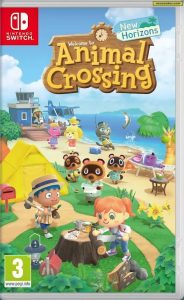
Developer: Nintendo
Year: 2020
Relevant Social Movements: Free Hong Kong, Black Lives Matter
To understand the social and communicative affordances of Animal Crossing: New Horizons, it is important to consider what the intended use of the game was. Drawing on Light et al.’s theory of intended use, the discrepancy between the perception of the game developers and the variety of use becomes even more apparent and salient (Light et al. 2016, 17). The game was originally conceived as a casual life simulator where the player “escapes to a deserted island (Animal Crossing).” The game is also structured to afford this kind of detached, peaceful gameplay. The atmosphere of the game is friendly and cooperative, with the NPCs (Non-Playable Characters) being distinguishably apolitical and welcoming. Even the least receptive kinds of NPCs will eventually open up to the player character as they progress through the game. It is almost impossible to upset a NPC unless the player goes out of their way to do so.
Despite this environment, the possibilities for political and partisan speech and expression are very high. Messages can be spread through in-game designs or custom-made signs. This can include expressions for entertainment purposes, but they can also be more controversially political or partisan. This includes placing patterns that spell out “Free Hong Kong,” shirts with Black Lives Matter, or signs and islands that support Joe Biden for president of the United States [see fig. 1] (Bernhard 2020; Schofield 2020; Marshall 2020).

Source: The New York Post
Although players heavily use the affordances of the game for their own ends, this does not mean animal crossing is without its restrictions. The ability to speak is very limited. Players can only write very short sentences in chats and they are limited to just a few sentences in letters. Moreover, you can only speak to people with whom you have already connected as friends. This severely limits communication and the possibility for connective action in a serendipitous sense. Moreover, the game actively resists its use for political purposes. Nintendo of Japan is known to censor the use of particular words, such as “COVID,” affirming a discomfort with political expression (Opsahl, 2020, Terms of Use (JP), 2020). Despite this, Nintendo is not known to ban players from the game for this reason, and the restrictions are fairly easy to circumvent. However, the chance of social action and gathering also decreases, as there can only be ten people on an island at the same time. This limits the potential for a digital social gathering without the use of an auxiliary platform massively.
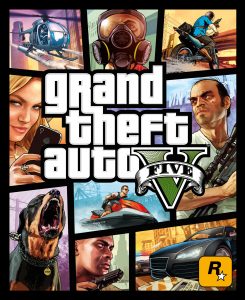
Developer: Rockstar Games
Year: 2013
Relevant Social Movements: Free Hong Kong, Black Lives Matter
GTA V Online is built around the player character engaging in a series of shady and illegal activities: from intercepting or facilitating arms dealings to robbing stores and killing NPCs and other players. The game heavily encourages this behavior. For example, you are being rewarded cash for completing missions with illegal activity, and you are rewarded when you frustrate another person trying to complete their mission. Nonetheless, this competitive and violent atmosphere does not prevent cooperation or peaceful social manifestations from taking place.
A group of small YouTubers gathered a group together to meet up in-game to pay tribute to George Floyd and the Black Lives Matter movement in early June [see fig. 2] (Moore 2020). Publisher Rockstar has also taken a stand in the protests, shutting the server down for two hours on June 4th in honor of George Floyd. This illustrates that the political leanings of the company owning the game also has profound effects on the players in the game itself. Rockstar also encouraged its users to donate to the Black Lives Matter cause via their social media platforms, despite not stating they themselves donated to the cause. On the other hand, Rockstar have outspokenly stated they are donating 5 percent of profits from their in-game purchases from GTA and Red Dead Redemption to COVID-19 relief. Suggesting a potential performative version of activism, or “slacktivism,” without fully standing by the Black Lives Matter movement (Reisinger and Morris 2020)
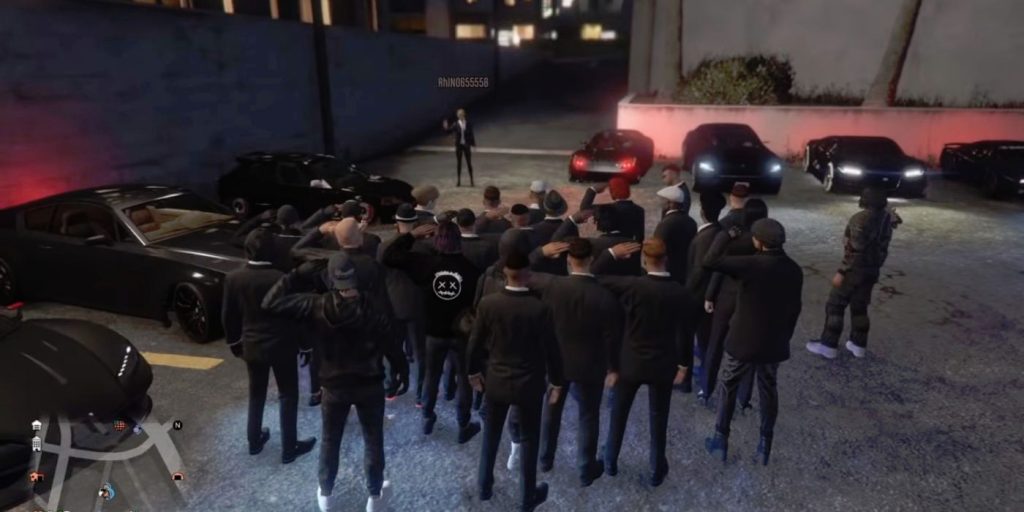
Source: Mimic News
GTA V Online also allows two sides to a social movement to demonstrate against each other actively. Although dividing players between rioters and riot police was not the intended use of GTA V Online, its affordances made this possible when players from Hong Kong and Mainland China did exactly that. By using the large lobbies of GTA V online as gathering places and using the available cosmetics to identify themselves with the side they were on, they moved their real-life differences online (BBC, 2019). Although the lobbies are large and often public (meaning everyone can join), there are still several limitations to overcome for any social movement in GTA. The game is quite expensive, meaning that a social movement would only reach a very select group of people. The game also has some political censorship, such as prohibition of the word “Nazi.” Rockstar states that it will not tolerate “any material that is knowingly false or defamatory, inaccurate, abusive, vulgar, obscene, profane, hateful, harassing, sexually-oriented, threatening, invasive of one’s privacy, in violation of any law, or inconsistent with community standards (Rockstar, n.d.).”
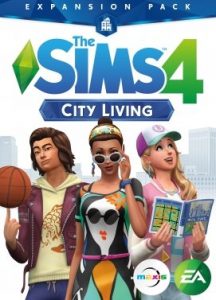
Developer: Electronic Arts (EA)
Year: 2016
Relevant Social Movement: Black Lives Matter
The Sims is a popular virtual world game, which was originally made as a single-player game where the player would create an avatar, or a family of avatars, build their house, and play out their lives as these characters. When the City Living expansion pack was released in 2016, players got new in-game features and were now able to live in apartments in the inner-city and surround themselves with other players. The new features included open areas within the city, like a city hall, festivals, a spice market, and a fashion district, where the avatars can hang out and meet other players. New features also included new career options, such as social media, critic, and politician. The idea of adding a political career feature affords users to create and hold protests within the game. The introduction of this feature was a refreshing choice by EA in an attempt to encourage players to openly get involved in socio-political movements by choosing causes to support and advocate for and motivate other players to also get involved.
End users have eagerly accepted this new feature by creating numerous protests weekly and spreading the message through online forums and social media platforms to encourage more players to gather. The most notable protest was one created by The Sims user Ebonix after the death of George Floyd, in honor of all those who have lost their lives to police brutality and the Black Lives Matter movement. Unlike Animal Crossing, The Sims: City Living does notspecify a maximum number of players that can gather at once; Ebonix managed to gather 200 participants for her protest (Schofield 2020).
However, The Sims is not without its constraints. Throughout all the updates and various versions of the game, an in-game communication feature is still not available; instead, the avatars speak a made-up language called “Simlish.” This lack of communicative affordance creates challenges when players want to talk in the game, but players have found various other methods to get their messages across. For example, Ebonix created an online “simfiles” for users to download externally and insert into the server that included t-shirts, sweaters, and signs with Black Lives Matter slogans and text, which were used and worn by the avatars that took part in the protest [see fig. 3] (Schofield 2020).
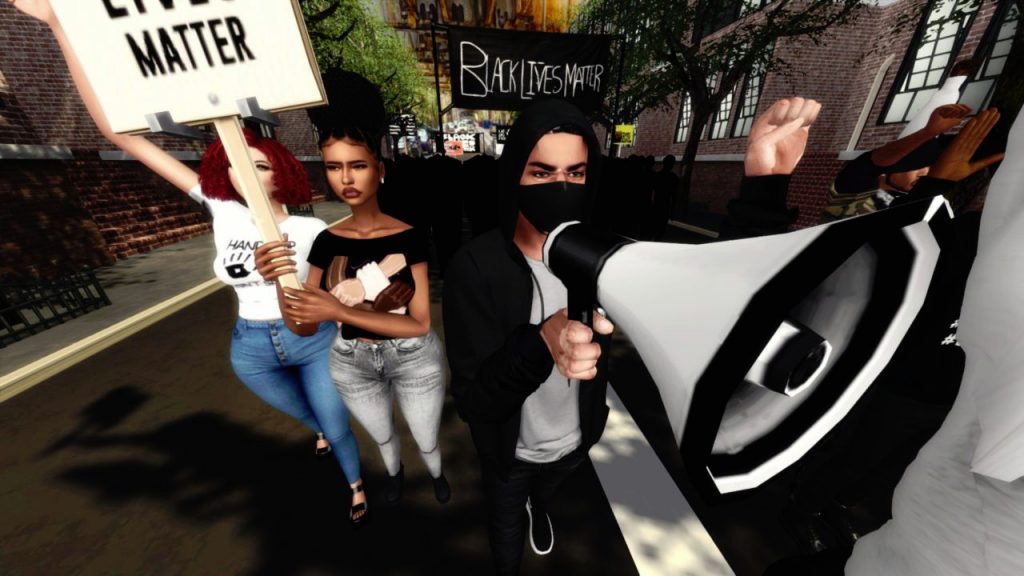
Source: Kotaku Australia
The game’s developer EA released a statement saying they donated 1 million dollars to the Black Lives Matter movement as part of their initiative to “fight for racial justice in the U.S. and against discrimination around the world,” as their sole initiative (EA, n.d.).
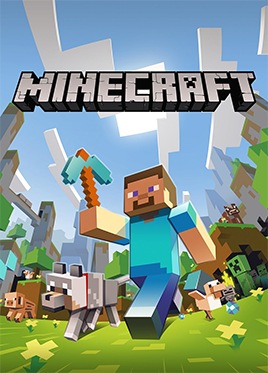
Developer: Mojang Studios
Year: 2011
Relevant Social Movements: Free Hong Kong, Black Lives Matter, Reporters Without Borders, Israeli-Palestinian conflict movements
Minecraft is an open-world sandbox game that involves players exploring an endless generated world, in which they have to gather materials, build objects, and craft items. A feature of the game is the online servers, which grant the players a space to connect and play together online. The players can communicate through a chat system that consists of the players username and the message they have written. Usually, servers contain players who share an interest in particular modes of gameplay or particular media (such as Lord of the Rings or Star Wars-themed servers), which allows users to discuss and play freely.
The seeming innocence of the game does not mean that it is a non-political children’s game. The public sphere of the servers also allows for political discussions and online activism by partisan individuals, and discussion happens in various forms. For example, the freedom of expression in the worldwide game allows political speech, particularly in nations that are heavily influenced by censorship. The fact that Minecraft is ubiquitously playable and easy to download on both mobile devices and computers means that the game is easy to access for a broad audience.
This is especially the case in Hong Kong, where political dissenters use designated political servers to speak freely outside of the control of China (u/AntiferromagneticJet 2020). In addition, the game’s accessibility and programmability affords a rapid spread of news articles to countries that lack freedom of speech and expression. The non-profit organization, Reporters Without Borders, makes active use of this and uses Minecraft’s “The Uncensored Library” to share news stories from journalists from Saudi Arabia, Russia, Egypt, Vietnam, and Mexico [see fig. 4 & fig. 5] (Huddleston Jr. 2020).
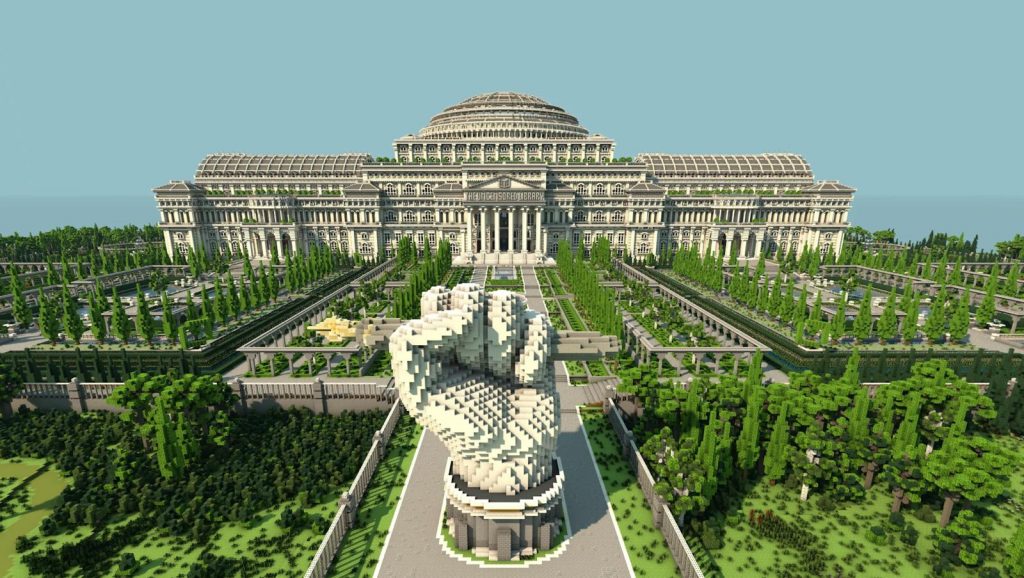
Source: Popular Mechanics
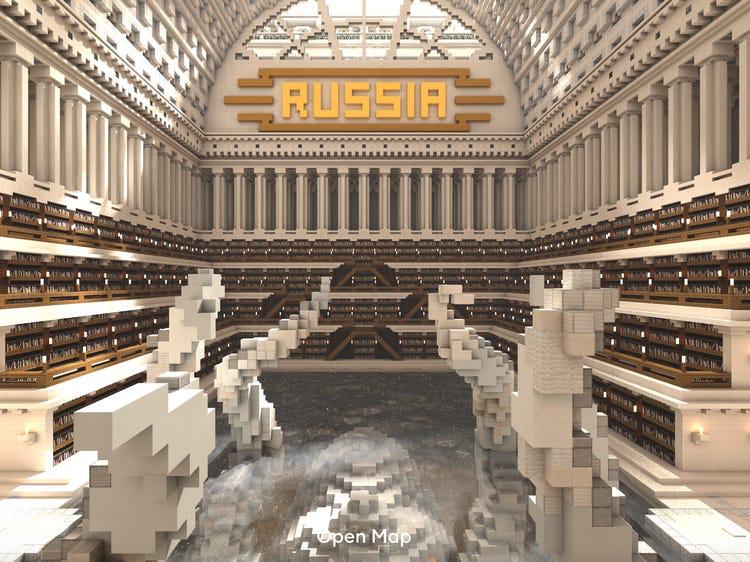
Source: Business Insider
The social aspect of playing together and connecting with one another does not only tie people with similar interests together but can also bring people closer and eliminate social bias. The relaxed and cheerful ambiance of Minecraft encourages amicability. Organizations actively harness this, such as the Games for Peace project, which encourages Israeli and Palestinian children to “play together, getting to know each other while working towards a common goal, which will gradually disarm any preconceptions the children have about other cultures – steeling them against stereotypes in daily life (Evans-Thirlwell 2015)”.
Minecraft’s developer, Mojang Studios, actively supports activism and pledged to donate all their profits made on June 19, 2020, to the Black Lives Matter movement, in commemoration of Emancipation Day (Juneteenth). This includes profit generated from Minecraft, Minecraft Dungeons, and shows that the platform is not only an infrastructure for resistance, but it is also able to transform the player base into a commodity for a social movement.
Results and Conclusion
By determining these social movements’ technological bases, we have sought to illuminate the commonalities and differences that exist in all of these games. In narrow senses, the affordances vary widely. Animal Crossing: New Horizons allows for very minimal voice lines, and The Sims only allows players to communicate via ‘Simlish.’ Whereas GTA offers a very high possibility of meeting new people and spreading a message, in Animal Crossing, this possibility doesn’t exist without the help of an auxiliary platform, like Reddit or Twitter. And while some companies are hammering down on political neutrality, Minecraft vocally endorses certain initiatives to take root in itself. Nonetheless, what all these games have in common is that they are infrastructures of resistance in their own unique ways. They facilitate a social movement either through non-verbal expression or the ability to simply be virtually together. Especially in a time when physical protest is very difficult, the affordances of video games are creatively exploited to substitute a physical presence.
The video game industry is extremely dynamic and ever-changing, continuing to grow in popularity. The video game industry is vastly large, larger than the music and movie industries combined, with more than 2 million gamers worldwide, despite not being studied as heavily (Beattie 2020). In previous research, the gaming industry has been criticized for its portrayal of violence, women, and encouraging social isolation. However, it is critical to determine the positive elements of video games and how they can afford positive change. Despite their often limiting social and communicative affordances, the use of video games for digital action is also a testament to how resourceful humanity really is.
In our analysis of these six digital infrastructures, we have sought to broaden the notion of Dynamic Network Action, as presented by Benett and Segerberg. Their article was written under wholly different circumstances, as none of the games we have investigated were present at that time, the social movements were in different phases or were manifest differently, and COVID-19 played no role. However, the incredible social and communicative affordances that games have proven to possess in times of crisis means that digital games should be more actively considered in studies of digital social movements in the future. With this essay, we hope to contribute to that exact goal.
Bibliography
Beattie, Andrew. 2020. “How the Video Game Industry is Changing.” Investopedia, May 7, 2020.
Benett, W. Lance, and Alexandra Segerberg. 2012. “The Logic of Connective Action.” Information, Communication & Society 15, vol. 5: 739-768.
Bernhard, Max. 2020. “On lockdown, Hong Kong activists are protesting in Animal Crossing.” Wired, April 7, 2020.
Davis, Jenny L. and James B. Chouinard. “Theorizing Affordances: From Request to Refuse.” Bulletin of Science, Technology & Society 36, vol. 4: 241-248.
Electronic Arts, n.d.. “Our Actions Against Racial Injustice.” Accessed October 14, 2020. https://www.ea.com/news/ea-actions-against-racial-injustice.
Evans-Thirlwell, Edwin. 2015. “How ‘Minecraft’ Is Connecting Kids Caught Up in the Israel-Palestine Conflict.” Vice, December 11, 2015.
Gaver, William W. 1996. “Situating action II: Affordances for interaction: The social is material for design.” Proceedings of the SIGCHI conference on Human factors in computing systems, ACM: 79-84.
Gibson, James J. 1986. The Ecological Approach to Visual Perception. New York and Hove: Psychology Press.
“Hong Kong and mainland China gamers clash on GTA V.” BBC, December 23, 2019.
Huddleston Jr., Tom. 2020. “Reporters Without Borders is using Minecraft to sneak censored news to readers in restrictive countries.” CNBC, March 15, 2020.
Hutchby, Ian. 2001. “Technologies, texts, and affordances.” Sociology 35, vol.2: 441-456.
Hutchy, Ian. 2001. Conversation and Technology: From Telephone to the Internet. Cambridge: Polity.
Light, Ben, Jean Burgess, and Stefanie Duguay. 2016. “The walkthrough method: An approach to the study of apps.” New Media & Society: 1-20.
Marshall, Cass. 2020. “Joe Bidden sets up his own Animal Crossing island for the presidential campaign.” Polygon, October 15, 2020.
Moore, Ewan. 2020. “‘GTA Online’ Players Hold Virtual Memorial For George Floyd.” Lad Bible, June 10, 2020.
Norman, Donald A. 1988. The psychology of everyday things. New York: Basic Books.
Opsahl, Kurt. 2020. “What the *, Nintendo? This in-game censorship is * terrible.” Electronic Frontier Foundation, September 16, 2020.
u/AntiferromagneticJet. 2020. “A Minecraft Server for HK.” Reddit, 2020. https://www.reddit.com/r/HongKong/comments/gwdm0h/a_minecraft_server_for_hk/.
Reislinger, Don, and Chris Morris. 2020. “Rockstar to shut down GTA Online, Red Dead Online in support of Black Lives Matter.” DigitalTrends, June 4, 2020.
Schofield, Daisy. 2020. “Black Lives Matter meets Animal Crossing: how protesters take their activism into online video games.” The Guardian, August 7, 2020.
Schrock, Andrew R. 2015. “Communicative Affordances of Mobile Media: Portability, Availability, Locatability, and Multimediality.” International Journal of Communication 9, vol. 0: 1229-1246.
Wellman, Barry. 2001. “Physical place and cyberplace: The rise of personalized networking.” International journal of urban and regional research 25, vol. 2: 227-252.